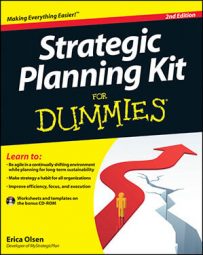More often than not, life and daily operations take over a well-intentioned strategic management process. If the strategic plan is one more thing people have to do, it begins feeling like a burden instead of being exciting. Following are some tips to help keep your company’s strategic plan current, relevant, and always moving forward.
Appoint a strategy manager
Like any business process, you need a business process owner. Strategic planning is no different. Appoint someone (other than yourself) to run the strategic management process. Anoint him or her as the strategy manager who’s responsible for the following:
Keeping track of your progress through the use of a scorecard
Getting updates from managers and staff on goals, objectives, and action plans
Organizing meetings and communications about the strategic plan
Keeping the plan relevant by adapting it based on changes throughout the year
Get everyone involved in the plan
Make your organization’s plan everyone’s plan. Start by involving everyone on your staff in the beginning of the process. If you look only to the management team, you create a recipe for failure. Employees at all levels are not only a wealth of information but also the implementers of your plan. You need them to feel part of the planning process, even if they don’t have a seat at the table.
Use group exercises and employee feedback to help develop a strategic plan that everyone feels part of and assign every staff member a goal or objective. Then, everyone has direct responsibility for achieving a piece of the organization’s strategy.
Hook achievement into incentives
Everyone likes to be rewarded for a job well done. Dangling a carrot out there for successfully implementing your strategic plan is a sure way to get some action. Incentives take all different shapes and colors. The green kind (ahem, money) is always welcome, but you can develop all sorts of creative perks. By paying for performance, you elevate the importance of your strategic plan.
Hold a monthly strategy meeting
Groan . . . another meeting? Well, yes and no. Replace one of your regularly scheduled staff meetings with a strategy meeting. Meetings about strategy can be exciting, and people want to be involved. The purpose of the meeting is to discuss the status of your plan. Cross off what’s been completed. Troubleshoot if something isn’t happening. Make changes where needed.
If your meetings are boring, spice them up a bit. Ask each employee to report on an accomplishment or two. Limit everyone’s report to one minute (have someone keep time). Ask people who are having an issue or problem where they need help to list it on the board. Spend 10 to 15 minutes as a group working to solve the issue. Remember, the issues need to be related to the strategic plan; otherwise, they should be discussed at another time. Don’t let the meetings run over; keep them to a set time.
You may be surprised at the enthusiasm and effectiveness of this type of meeting. People like to talk about strategy. It’s exciting! It’s also exciting to accomplish important initiatives.
Lead by example
Be a purposeful leader, and your people will follow. There’s no better way to keep your strategy alive than through your leadership. Your complete and total commitment is critical to the success of your plan. If you pull back, even just a little, you give everyone a license to slack off.
So regularly talk about your organization’s strategy. Use it in conversations with clients, customers, and board members. Ask your staff questions about your plan’s progress — is it working or not? When making budget decisions, point back to your plan. Does the budget fit into your plan?
Celebrate your success — whenever you feel like it
Too often, you’re so focused on tomorrow’s tasks that you forget to recognize today’s successes. Don’t wait until the end of the year to recognize achievement. Celebrate small successes along the way! Did you achieve a big goal? Have a pizza party. Take the staff to lunch. Give everyone the day off. Go on a fun outing. No matter how big or small, celebrating successes along the way keeps everyone excited, engaged, and motivated to keep working.

